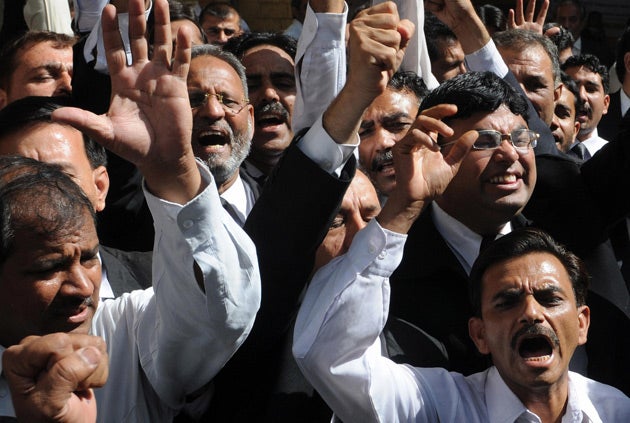Your support helps us to tell the story
From reproductive rights to climate change to Big Tech, The Independent is on the ground when the story is developing. Whether it's investigating the financials of Elon Musk's pro-Trump PAC or producing our latest documentary, 'The A Word', which shines a light on the American women fighting for reproductive rights, we know how important it is to parse out the facts from the messaging.
At such a critical moment in US history, we need reporters on the ground. Your donation allows us to keep sending journalists to speak to both sides of the story.
The Independent is trusted by Americans across the entire political spectrum. And unlike many other quality news outlets, we choose not to lock Americans out of our reporting and analysis with paywalls. We believe quality journalism should be available to everyone, paid for by those who can afford it.
Your support makes all the difference.Pakistan's year-old civilian government sought a compromise to appease opposition leaders and a lawyers movement today as police detained hundreds of activists in a bid to stifle a nationwide protest.
ties for an independent judiciary threatens to bring political turmoil and comes as President Asif Ali Zardari's government is struggling to check rising Islamist militancy and to revive a sinking economy.
Black-suited lawyers and flag-waving opposition activists launched a so-called long march from the cities of Karachi and Quetta yesterday, and aim to reach Islamabad on Monday.
The government has tried to foil the protest with detentions, bans on rallies, and road blocks, while at the same time looking for a way to avert a showdown that could become violent.
Under a compromise Prime Minister Yousaf Raza Gilani is pushing, Zardari has agreed to yield ground to opposition demands, according to a presidential aide, speaking on condition of anonymity.
The protesters are demanding the reinstatement of former Supreme Court chief justice Iftikhar Chaudhry, who was dismissed by former president and army chief Pervez Musharraf in 2007.
Zardari has refused to reinstate the judge, seeing him as a threat to his own position, but the presidential aide said under the proposed compromise a constitutional court and an appellate court would be set up and Chaudhry would head one.
Nawaz Sharif, a former prime minister, has backed the lawyers, putting him into open confrontation with Zardari.
"We still believe there is a way out, we still believe that the elected prime minister of Pakistan should play his role," Chaudhry Nisar Ali Khan, a senior leader in Sharif's party, told reporters in Islamabad.
"We even believe that options and space are available for Mr. Zardari to re-think, to come back from the brink," he said.
Skirmishes, protest leaders arrested
Pakistan's efforts to eliminate Taliban and al Qaeda enclaves on the Afghan border are vital to US plans to stabilise Afghanistan and defeat al Qaeda. The last thing the United States wants to see is Pakistan consumed by turmoil.
If the crisis gets out of hand, the army, which has ruled for more than half the country's 61 years of history, could feel compelled to intervene in some way.
Several leaders of the protest in Karachi were arrested during skirmishes when the procession reached the outskirts.
The convoy that left Quetta was also blocked, although protest organisers said they were determined to get to the capital, where they plan a sit-in outside parliament.
Some 800 activists were detained in the key central province of Punjab, an official said, while dozens more were held in Peshawar, the main city in the northwest.
Zardari spoke by telephone with the US special envoy to Pakistan and Afghanistan, Richard Holbrooke, and Ambassador Anne Patterson for 30 minutes on Thursday, Zardari's office said.
State Department spokesman Robert Wood said the United States wanted to stress that violence should be avoided, the rule of law respected and that there should be no impediments to peaceful, democratic activities.
Sharif was infuriated by a Supreme Court ruling last month barring him and his brother, Shahbaz, from elected office, and by Zardari ejecting his party from power in Punjab and imposing central rule.
Under the proposed compromise, Shahbaz Sharif, who until the court ruling was chief minister of Punjab, the most populous and most influential of Pakistan's four provinces, would be granted an appeal against the court ruling, the presidential aide said, and the province's assembly would choose a chief minister.
It was also proposed that Zardari would live up to a promise to let go of some of the sweeping presidential powers established by Musharraf, and a constitutional reform package would be introduced in parliament.
"These are all the things being discussed, but nothing is 100 percent yet," said the presidential aide.
A senior politician privy to the negotiations said the next 48 hours were crucial: "It will be make or break".
The protesters vowed to press ahead.
"The way our lawyers were beaten up and arrested, we've decided that we need to intensify our struggle," Ali Ahmed Kurd, president of the Supreme Court bar association and a protest organiser, told reporters in Baluchistan province.

Join our commenting forum
Join thought-provoking conversations, follow other Independent readers and see their replies
Comments